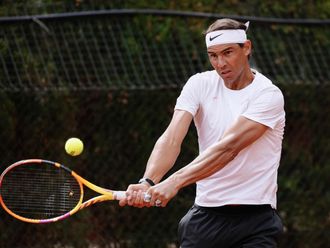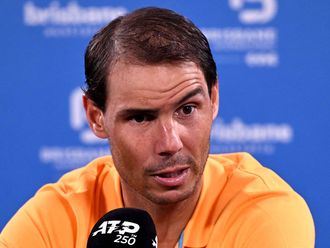Paris: Leaked records from a raft of sports stars have highlighted the use by many household names of therapeutic use exemptions (TUE), blasted by hackers as licences for doping but hailed by athletes as essential medical care.
What medical details have been leaked?
Between September 13 and Monday, a hacking collective known as the Fancy Bears, thought to be operating from Russia, has released four reports listing confidential medical records for 66 athletes. American tennis stars Serena and Venus Williams, four gold medal-winning Rio Olympic gymnast Simone Biles, three-time Tour de France winner Chris Froome and British teammates and Rio gold medallists Bradley Wiggins and Mo Farah, as well as Spanish tennis legend Rafael Nadal, are among those whose details have been made public.
The hacked details come from files that were stolen from the Anti-Doping Administration and Management System (ADAMS) of the World Anti-Doping Agency (WADA), which allows that body to record and follow up on athletes’ drugs tests.
All details released so far relate to TUEs, which allow banned substances to be used for medical reasons.
“We go on exposing the athletes who violate the principles of fair play by taking doping substances,” say the Fancy Bears, claiming TUEs are “licences for doping”.
WADA insists not, saying the leaked records mirror the strategic interests of the Russian government, which has recently been linked with state-sponsored doping that saw all but one of its track and field athletes banned from the Rio Games.
TUEs, why use them?
According to WADA, athletes may have illnesses or conditions that require them to take particular medications.
If the medication an athlete is required to take to treat an illness or condition happens to fall under the prohibited list of banned substances, a TUE may give that athlete the authorisation to take the needed medicine.
Track and field supremo Sebastian Coe, a two-time Olympic 1500m gold medallist who used a spray to combat asthma during his own career, insisted that sportsmen and women suffered from the same ailments as the public did.
“When you ask permission to take something for therapeutic reasons and they give it to you, you’re not taking anything prohibited,” added Nadal, a 14-time Grand Slam winner.
How does an athlete get a TUE?
“TUEs are only given on the basis of an independent panel, it is not a general practitioner signing them off,” said Coe.
Requests are often handled by the athlete’s regular doctor and relayed to the organisation overseeing their relevant sport, international federation and anti-doping agency.
The request is studied by a scientific panel of three independent experts who must rule unanimously.
The trio are drawn “from outside the sporting world and federations”, according to Professor Xavier Bigard, scientific advisor of the French Anti-Doping Agency and member of the WADA committee charged with determining banned substances.
“There’s never any laxness about it nor authorisation of doping.”
Once accorded, the TUEs are registered in the ADAMS system and consultable by WADA medical teams.
Are TUEs commonplace?
That depends on the country and the sport. Professor Bigard deals with around 400 requests every year in France, with two-thirds accorded. While insulin is almost always allowed, betablockers are normally always disallowed for archers or shooters because they are viewed as significantly performance-enhancing.
In certain countries, amphetamines are currently used in the treatment for attention deficit disorder, as was the case for Simone Biles, prescribed Ritaline since her childhood and whose name was unveiled in the first Fancy Bears leak.
Cyclists regularly request TUEs for products to ease respiratory problems, but there is much less demand among footballers. FIFA doctor Jiri Dvorak said eight TUEs were awarded for the 2014 World Cup and just three for the Rio Games.
Are TUEs contested?
Sometimes, notably in the world of cycling, for fear of abuse.
In 2014 French newspaper Le Journal de Dimanche reported that Chris Froome had received a TUE from an International Cycling Union doctor without validation from a panel of experts to take the banned steroid prednisolone because he was suffering from a chill.
Gerard Guillaume, doctor with the French cycling team Francaise des Jeux, said at the time that if a cyclist’s health was such that he needed such a treatment, he perhaps should not start the race.




![Copy of 920889-01-02 [1]-1713093032070](https://imagevars.gulfnews.com/2024/04/14/Copy-of-920889-01-02--1--1713093032070_18edc4d3895_small.jpg)







